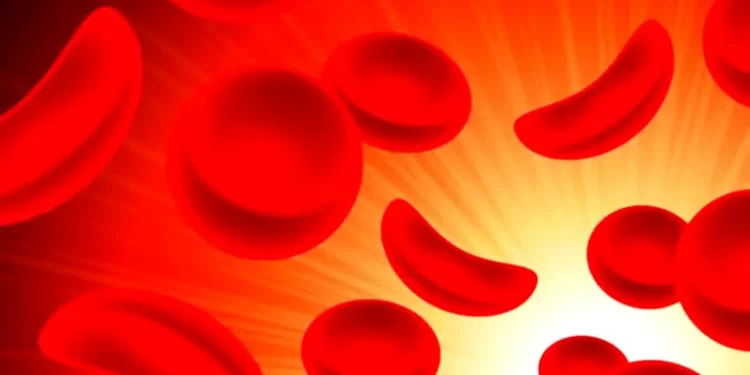Sickle cell anaemia is a serious blood condition that can cause a slew of consequences if not treated promptly. Stroke, heart attack, organ failure and death are all possible complications.
Pain is a central characteristic of the disease, with patients having inexplicable chronic, pruritus throughout their lives, resulting in many hospitalisations, despite the fact that the majority of episodes are handled at home without the need for medical assistance.
Nigeria accounts for about half of the world average of much more than 400,000 newborns each year with acute haemoglobin abnormalities, with an estimated 200,000 newborn babies per year with sickle cell anaemia, the most prevalent type of sickle cell disease.
That implies Nigeria is the country with the greatest prevalence of sickle cell disease in the world. According to medical experts, these alarming figures have labelled Nigerians as reprobates in the international community.
The Nigerian Federal Government, on the other hand, seems unconcerned about the nation’s status as the world’s epicentre of the epidemic, with past governments making no visible effort to eradicate it.
It is critical to plan considerable actions to educate the public about the dangers of this disease, otherwise, Nigeria would continue to tickle in the shadows for fictitious answers.
Unfortunately, sickle cell patients are treated with contempt at government hospitals, and it is sad that nurses and doctors in some government hospitals don’t grasp what a vaso occlusive crisis is or how to manage it. Only a few actually understand how to treat and care for these amazing patients, and we much appreciate their efforts. They are, without a doubt, our heroes.
However, there is a lot of work to be done, but only a few people are prepared; just a few volunteers are willing to take up the cause of action.
This is because government does not support the few legitimate, functioning and passion-driven foundations.
Therefore, sickle cell patients are tossed around like trash, with a series of discriminations hanging on their necks and stigmatisation at work which result to a number of them losing their jobs and others being unable to find work.
It is regrettable that these folks bear such a heavyweight alone, with their families and loved ones having little to do to help. Nonetheless, government’s excellent intentions in the health sector cannot be overlooked, but it is critical that they come to the aid of those suffering from the identified disorders.
This can be accomplished by providing free drugs to treat ailments.
This can be accomplished by providing free drugs to treat ailments.
As a result, the financial burden of treating Sickle Cell Disease, SCD, will be dramatically reduced. The monthly provision of free medications will help to reduce their misery. The treatment of diseases can also be brought under the National Health Insurance Scheme through a suitable insurance scheme.
If a patient also doesn’t have health insurance, he or she will have to pay for medical treatment out of pocket, especially if the surgery is costly, such as hip replacement therapy. In recent studies, the cost of a hip replacement varies from one facility to the next and from state to state. In recent times, the average cost of a hip replacement in Nigeria, with implant fees, was over N20 million.
How many of these patients are able to afford such a high medical bill? To remedy the gap in medicaid, government may provide supplemental insurance through the Healthy Ministry, which would save these folks a huge amount of money and concern.
Blood transfusions are still a common therapeutic option for sickle cell disease, SCD, patients with the goal of increasing blood oxygen-carrying capacity while also reducing the risk of vaso-occlusion consequences.
A sickle patient with HbSS and HbS0 thalassaemia with Hb 9 g/dL is required to get a postoperative basic infusion aiming at an Hb level of 10 g/dL, while having low- and moderate-risk surgery.
If a patient cannot afford the costly treatment and expense, achieving this is more challenging.
Sickle cell patients, to say the least, are prone to complications, particularly infections or abnormalities of the kidneys. Renal damage and sickle cell nephropathy, SCN, are two examples of underlying processes.
Both are linked to hypoxia and ischemia. RBC sickling and congestion in the vasa recta produce ischemia and renal tube damage.
In conclusion, the Nigerian government should come to the help of persons suffering from sickle cell Anaemia and Hepatitis as soon as possible. They should explore ways to deliver free drugs to those suffering from these debilitating conditions.
The number of persons living with the awful sickness should be known from primary school through tertiary education.
A realistic data set with an actual number of patients is required. Government should address the need and concerns for the elimination of hepatitis and sickle cell anaemia in the Nigerian population in the same way it addressed the HIV/AIDS epidemic.
Lastly, initiatives should be launched to give facilities, expertise, logistical assistance and maybe cash to those living with sickle cell disease and hepatitis.
*Dr. Suleiman, Vice President of Human Rights Watch and Youths Empowerment Foundation, wrote from Kaduna.






